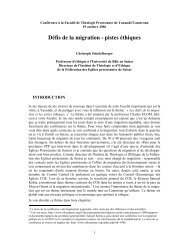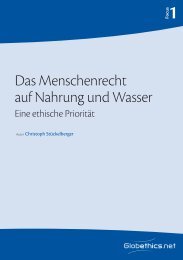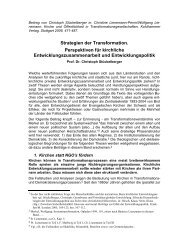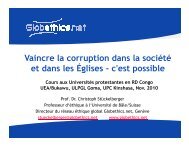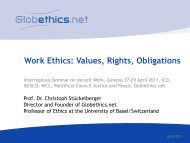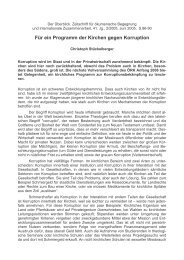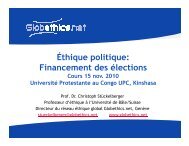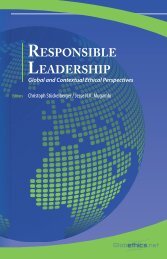BREAK THE CHAINS OF OPPRESION AND THE YOKE OF ...
BREAK THE CHAINS OF OPPRESION AND THE YOKE OF ...
BREAK THE CHAINS OF OPPRESION AND THE YOKE OF ...
Create successful ePaper yourself
Turn your PDF publications into a flip-book with our unique Google optimized e-Paper software.
The question has to be raised whether this close relationship between Christian<br />
faith and the project of Western modernity does not lead to the loss of the meaning<br />
of Christian faith it self. Or, to put it more bluntly: does this relationship not<br />
shape Christian faith into merely an ideology?<br />
Opposing voices<br />
HopE<br />
The approach towards history from an universal Christological perspective led to<br />
criticism from theologians in the Global South. One of the results of this criticism<br />
was the foundation of EATWOT in Dar-es Salaam, Tanzania, in 1976.<br />
Christians from the Global South had become aware that the ‘universal’ theology<br />
they had inherited from the West was not pertinent to their context of poverty<br />
and marginalization; traditional theology had to be reformulated become<br />
meaningful to peoples struggling for a more just and egalitarian world. 10<br />
At the one hand the objective of the appeal that came from theologians from the<br />
Global South was the context of (economic) injustice. At the other hand, the focus<br />
was a hermeneutical one. Western concepts of ‘universality’ tend to look upon<br />
other values and cultures as realities which have to be reshaped. This becomes<br />
even more apparent in approaches that look upon secularization as an inherent<br />
result of the global spread of the Gospel (and of modernization). In his book The<br />
Secular City, published in 1965, that came with the subtitle “Secularization and<br />
Urbanization in Theological Perspective”, Harvey Cox argues that secularization<br />
is itself a result of biblical faith and that secularization sets the agenda which<br />
gives meaning to the church's mission. According to Cox the biblical commandment<br />
‘no other gods’ led historically to the ‘disenchantment’ of nature and the<br />
relativization of politics � �and values. � Therefore the �church � must learn to ‘speak in<br />
a secular fashion of God,’ as the liberating power operative in nature and history<br />
that is discerned through the model of the Exodus.<br />
Ultimately this point of view does not only lead to the loss of the identity of<br />
Christian faith, it also proclaims a kind of universalism that is rather narrowminded:<br />
it only takes into account the Western context which further is seen as<br />
absolute and universal.<br />
9 ‘Die quasi naturhaft gedachte, christologische Gesamtqualifikation der westlichen<br />
Fortschrittsge schichte führt damit (...) zu der Tendenz, dass das Credo des Glaubens<br />
und das Credo des westlichen Fort schritts eigentümlich miteinander Verschmelzen<br />
oder jedenfalls bisweilen ununterscheidbar anei nanderzurücken scheinen.’ Dietrich<br />
Werner in his research on the missionary approach within the World Council of<br />
Churches, Mission für das Leben - Mission im Kontext, Ökumeni sche Perspektiven missionarischer<br />
Präsenz in der Dis kussion des ÖRK 1961-1991, Rothenburg, 1993, 99, 83-<br />
120, 149.<br />
10 http://www.eatwot.org/index.php?option=com_content&task=view&id=27&<br />
Itemid=26<br />
�����������������������������������������<br />
� � � � � � � ���������������<br />
�<br />
– <strong>THE</strong>OLOGY <strong>OF</strong> HOPE IN TIMES <strong>OF</strong> GLOBALIZATION – 61



